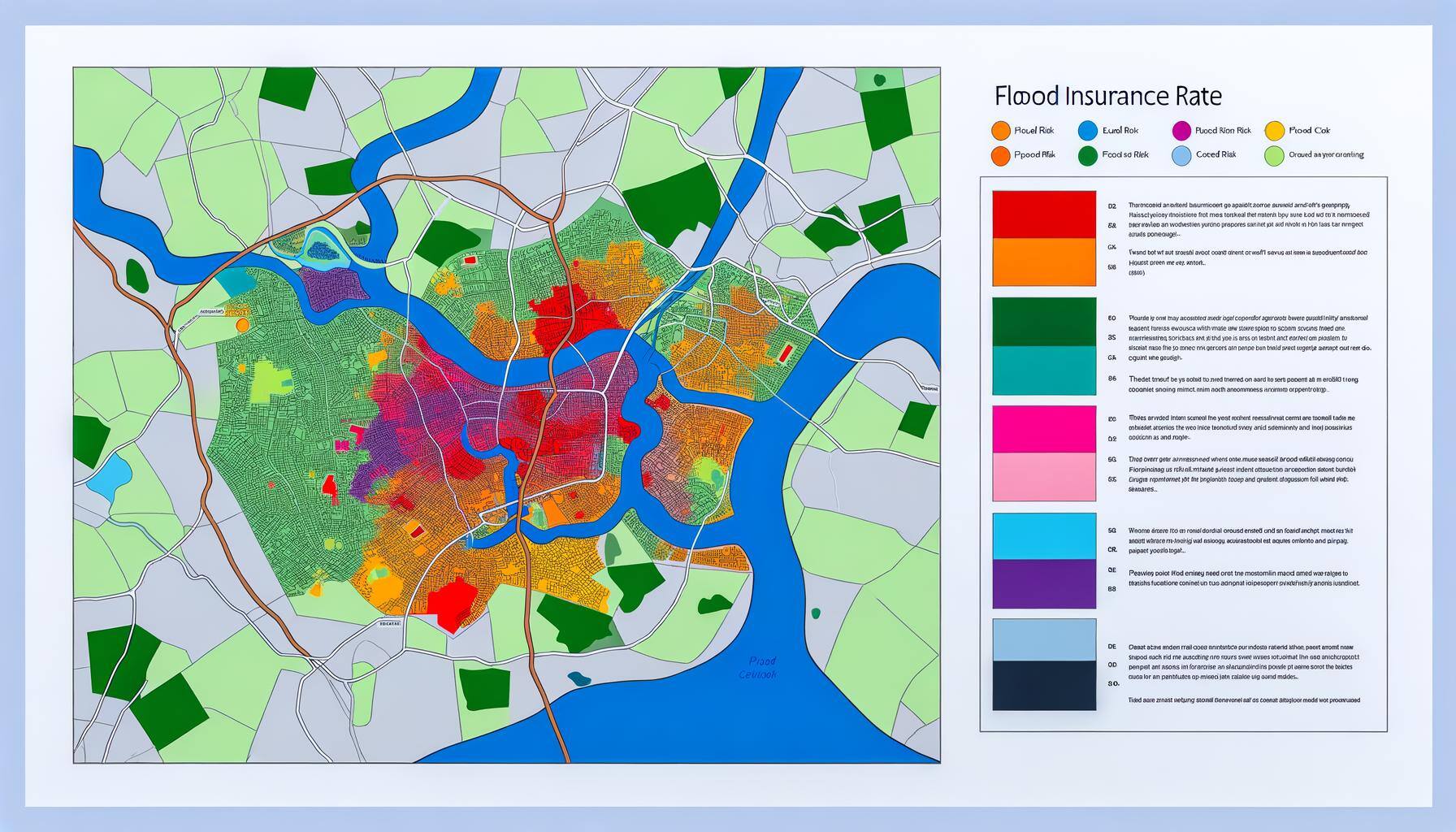Savannah Georgia Flood Zones: Homeowners Guide to Flood Insurance Cost
Welcome to our guide on flood insurance premiums in Savannah, Richmond Hill, and Pooler, presented by the Flood Insurance Guru.
As residents of these coastal and historic communities, understanding the intricacies of flood insurance is crucial for protecting your home and finances. This article will clarify the factors that impact your premiums, from Flood Zones and Base Flood Elevations (BFE) to local floodplain management efforts.
We’ll explore how these elements influence insurance costs and discuss strategies to mitigate risks and potentially lower your premiums. Whether your home is near the breezy shores or nestled in historic areas, our goal is to equip you with the knowledge to make informed decisions about your flood insurance needs.
Let’s dive into the complexities of flood insurance in Chatham County, ensuring you’re prepared to safeguard your property and financial future.
Factors That Influence Flood Insurance Premiums in Savannah, Richmond Hill, and Pooler
Flood insurance premiums can vary significantly based on several factors. Understanding these can help homeowners in Savannah, Richmond Hill, and Pooler better anticipate costs and take proactive steps to reduce their premiums.
1. Flood Zone
One of the most critical factors determining your flood insurance premium with the national flood insurance program or private flood insurance companies is the flood zone your property is located in. While these are not used for rates any longer within the federal government they can still give you a good idea of requirements and flood insurance pricing.
Homes in high-risk areas like Flood Zone AE or VE typically face higher premiums due to the increased likelihood of flooding. Properties in lower-risk zones, such as Zone X, will generally have lower premiums, although flood insurance is still recommended.
Flood Insurance Rate Maps
Flood Insurance Rate Maps (FIRMs) play a crucial role in determining insurance coverage for properties, especially in high-risk flood areas such as Chatham County‘s coastal regions. These maps help homeowners understand their flood policy needs, particularly if they reside in zones identified as having high flood risk. Standard home insurance policies typically do not include flood protection, making it essential for homeowners to secure additional flood insurance products to safeguard their investments.
When a homeowner faces a disaster due to hurricanes and tropical storms, they may need to file a flood claim. The amount of flood insurance required is often based on the property’s location within the designated floodplain and the average flood loss statistics provided by insurance providers.
To adequately protect your property, understanding the implications of FIRMs in floodplain management planning is vital, as it influences how much flood insurance is needed to cover the structure effectively.
2. Base Flood Elevation (BFE)
The Base Flood Elevation (BFE) is the computed elevation to which floodwater is anticipated to rise during a base flood (a flood that has a 1% chance of being equaled or exceeded in any given year). Homes built at or above the BFE have a lower risk of flooding, which can lead to reduced insurance premiums. Conversely, homes below the BFE may face higher premiums due to the greater flood risk. This number can typically be found on the flood insurance rate maps for Chatham County and unincorporated Chatham County.
3. Property Characteristics
Specific characteristics of your property, such as its age, construction type, and foundation, can also affect flood insurance costs. For example, older homes or those with basements may face higher premiums. Homes with elevated foundations or those designed with flood-resistant materials may be eligible for lower rates.
Distance to water
Distance to water can play a major role in Savannah GA flood insurance costs. Whether you are on Tyree Island with exposure to storm surge with coastal flooding or in Savannah historic district with exposure to flash flooding. Each water source can play a different role in flood insurance pricing.
4. Deductibles
Like other types of insurance, the deductible you choose for your flood insurance policy will impact your premium. As a property owner, a higher deductible means a lower premium but also a higher out-of-pocket cost putting you at risk if you need to file a claim. Homeowners should balance the deductible amount with their ability to cover potential flood damage costs.
5. Flood Mitigation Measures
Investing in flood mitigation measures can significantly lower your flood insurance premium. Actions such as elevating your home, installing flood vents, or reinforcing your foundation can reduce the risk of flood damage, making your property less costly to insure. FEMA and local agencies sometimes offer grants or incentives for homeowners who implement these measures.
The Role of Local Resources in Flood Preparedness
In addition to federal resources like FEMA, local insurance agencies in Savannah, Richmond Hill, and Pooler play a vital role in helping residents prepare for and respond to flooding.
1. Chatham County Emergency Management Agency (CEMA)
The Chatham County Emergency Management Agency is a key resource for residents in Savannah, Richmond Hill, and Pooler. CEMA provides critical information on flood risks, emergency evacuation routes, and disaster preparedness. They also issue warnings and updates during severe weather events, helping homeowners stay informed and take appropriate action.
2. Floodplain Management
Local floodplain management efforts in Chatham County help to regulate land use and construction in flood-prone areas, reducing the overall risk of flooding. These regulations ensure that new developments are built to withstand potential flood events, protecting property and lives.
Homeowners should be aware of these regulations when making modifications to their properties or when purchasing new homes. It may require financial assets you are not ready to take on.
3. Community Rating System (CRS)
The National Flood Insurance Program’s (NFIP) Community Rating System (CRS) encourages communities to go beyond the minimum NFIP requirements by implementing floodplain management practices that reduce flood risk. Savannah, Richmond Hill, and Pooler’s participation in the CRS can lead to lower flood insurance premiums for residents due to the community-wide efforts to reduce flood risk.
Steps Homeowners Can Take to Mitigate Flood Risks
While understanding your flood risk and purchasing flood insurance are crucial steps, homeowners can also take direct actions to protect their properties from potential flood damage whether they are in a high-risk or low-risk area.
- Elevate Electrical Systems — Raising electrical components like switches, sockets, and wiring at least one foot above the BFE can help prevent floodwaters from causing electrical damage. This simple step not only reduces the risk of costly repairs but can also contribute to lower insurance premiums.
- Install Sump Pumps and Foundation Vents — Installing a sump pump in your basement or crawl space can help remove water that accumulates during a flood, reducing the risk of water damage. Additionally, foundation vents allow floodwater to flow through your property, which can prevent water pressure from building up against your home’s walls, reducing the risk of structural damage.
- Use Water-Resistant Building Materials — If you’re building a new home or renovating an existing one, consider using water-resistant materials such as concrete, tile, or pressure-treated wood. These materials can withstand floodwaters better than traditional building materials, leading to lower repair costs after a flood.
- Keep Important Documents Safe — Store important documents, such as insurance policies, passports, and property deeds, in a waterproof safe or in a secure, elevated location. In the event of a flood, having these documents protected will be crucial for recovering from the disaster.
Understanding the Importance of Flood Insurance for Renters
While much of the focus is on homeowners, renters in Savannah, Richmond Hill, and Pooler should also be aware of their flood risk. While your landlord’s insurance might cover the building itself, it typically does not cover your personal belongings inside the rental unit.
Renters can purchase their flood insurance policy through the Federal Emergency Management Agency (NFIP) to protect their possessions from flood damage. This is particularly important if you live in a ground-floor apartment or a building located in a high-risk flood zone. You should ask your landlord if you are in a special flood hazard area. While renters are not typically required to carry flood insurance it can be the difference in financial protection and financial devastation.
Conclusion: Taking Action to Protect Your Home and Finances
Flooding is a significant risk in Savannah, Richmond Hill, Pooler, and the broader Chatham County area. By understanding your flood zone, purchasing the right insurance, and taking proactive steps to mitigate flood risks, you can protect your home, your belongings, and your financial well-being.
Remember, flood insurance is not just a requirement for some—it’s a wise investment for all. Whether you’re a homeowner or a renter, understanding your flood risk and being prepared is the best way to safeguard your future.
Frequently Asked Questions on Savannah GA Flood Zones
When considering living in Savannah, GA, many residents have frequently asked questions regarding flood zones. One common inquiry is whether homeowners need a flood insurance policy, especially since Savannah is located in coastal Georgia, an area prone to water-related risks. A standard homeowners insurance policy typically does not offer protection from flood damage, making it essential to understand the specific requirements for flood insurance.
Residents often learn about flood risks through various channels, such as television or the radio, which discuss how insurance products are governed by federal regulations. Premiums and coverage options are based on flood zone designations, which can significantly impact the cost and availability of insurance. Therefore, homeowners in Savannah must assess their flood risk and explore suitable insurance options to ensure they are adequately covered.
Do Savannah GA Homeowners Need Flood Insurance
Homeowners in Savannah, GA, should carefully consider whether they need flood insurance policies as part of their overall risk management strategy. Due to its proximity to the coast and various waterways, Savannah is prone to flooding, especially during heavy rains and hurricanes. Standard insurance policies often do not cover flood-related damages, making it crucial for homeowners to assess their vulnerability to such risks.
In many cases, obtaining a flood insurance policy can provide peace of mind and financial protection against potential losses. Homeowners in high-risk flood zones are often required to have this type of coverage, while those in lower-risk areas may still benefit from it.
Evaluating the specific risks associated with a property, along with consulting local flood maps, can help homeowners make informed decisions about whether a flood insurance policy is necessary.
What is the cost of flood insurance in Savannah GA
The cost of flood insurance in Savannah, GA, can vary significantly based on several factors, including the property’s location, elevation, and flood zone designation. Since flood risks can change over time, homeowners are encouraged to reassess their insurance needs regularly.
On average, residents might pay between $600 to $1,200 annually for a standard policy. However, those living in high-risk areas may face premiums exceeding $2,000, reflecting the increased likelihood of flooding. It’s essential to note that flood insurance is typically a requirement for homes located in Special Flood Hazard Areas (SFHAs), which can further influence costs.
Moreover, additional coverage options, such as contents insurance or higher policy limits, can also increase the overall premium. Homeowners should consult with local insurance agents to understand their specific risks and explore potential discounts available from the National Flood Insurance Program (NFIP). By being proactive about flood insurance, residents can better safeguard their properties against future flood events.
Information contained on this page is provided by an independent third-party content provider. This website make no warranties or representations in connection therewith. If you are affiliated with this page and would like it removed please contact editor @producerpress.com











